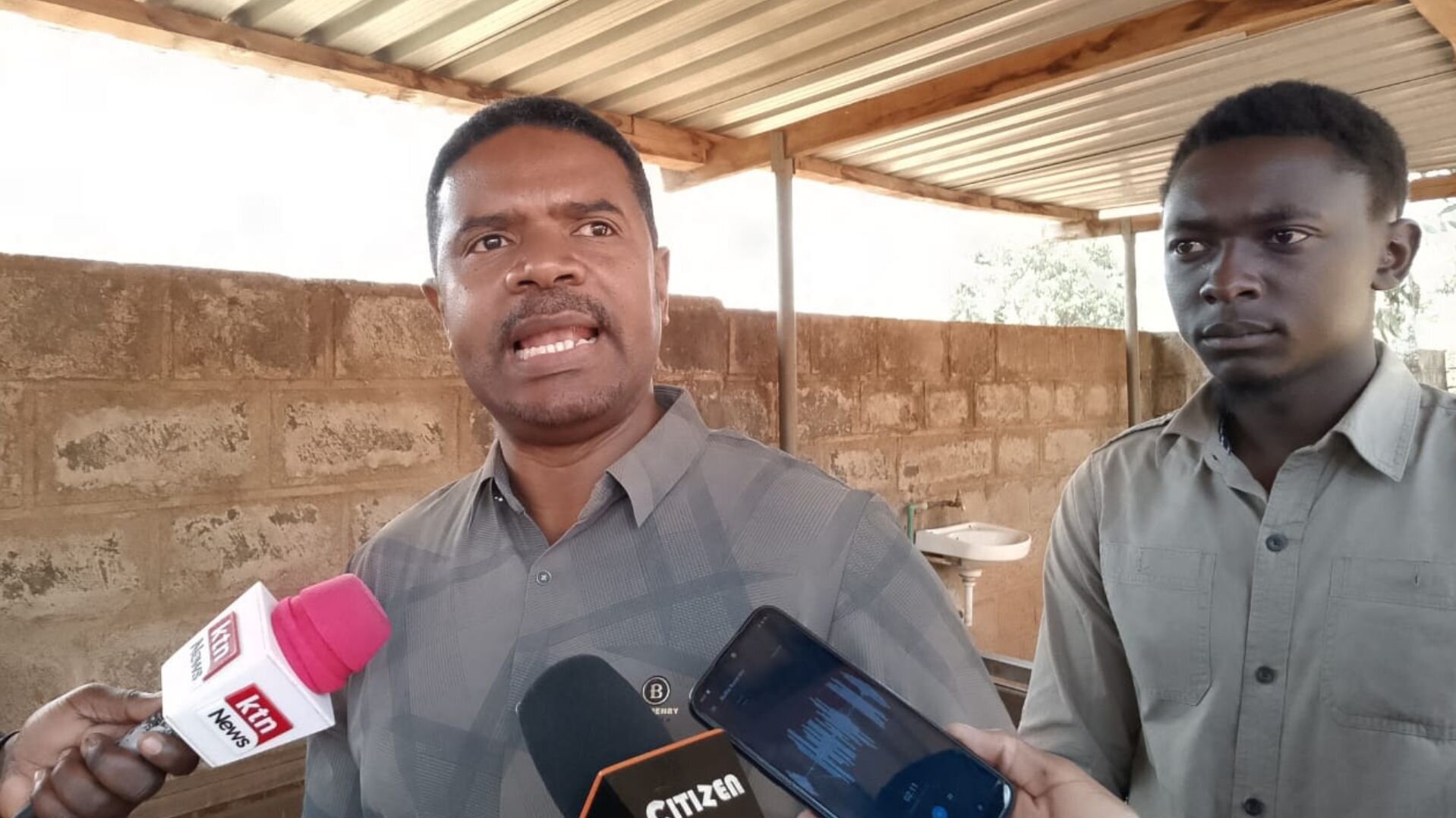Two months on, body of a protester still lies in a Nyeri morgue

Vocal Africa executive director Hussein Khalid addressing the media at Nyeri County Referral Hospital mortuary on October 2, 2024. Photo/James Murimi
More mystery has deepened over the unclaimed body of a man who succumbed to injuries sustained during the anti-Finance Bill 2024 countrywide protests on June 25, 2024.
The protester, identified only as John Thuku, was admitted at the Intensive Care Unit (ICU) of Nyeri County Referral Hospital (NCRH) on June 25, 2024, but died a month later while undergoing medication.
Two(2) months later, his body has been lying at NCRH’s mortuary, with the Kenya Police Service being blamed for not conducting thorough investigations to assist the concerned family to collect their kin’s body for burial.
Vocal Africa executive director Hussein Khalid accused the police of failing to capture the fingerprints of the deceased to ease his identification.
Hussein accused the detectives of laxity in following up the matter despite being advised by the Independent Policing and Oversight Authority (Ipoa) to do so.
“One of the reasons leading us to suspect ill-motives by the police is that they were advised by Ipoa to ensure that they get the finger prints of John Thuku. It has been two(2) months since he died and one(1) month after he was admitted to the ICU. But no officer or any other agency has taken the effort to collect his finger prints so that he can be identified,” Mr Hussein said.
The human rights activist was addressing the media at the mortuary in Nyeri town on Wednesday.
“This clearly shows the intent of the police to ensure that this person’s identity remains unknown. This shows why there is laxity and incompetence in the police service because they don’t want the identity of this individual to be known. It is just a simple exercise of taking fingerprints,” Mr Hussein said.
“We are appealing to Kenyans not to allow the government to hide the truth about the extent of killings that occurred during the peaceful protests,” he added.
As he was receiving treatment at the Nyeri County Referral Hospital (NCRH), no relatives visited Thuku, neither has been body identified since he died at the ICU in July.
The hospital’s deputy medical superintendent Dr Benson Ngari had, in an earlier interview with NTV last month, appealed to Kenyans to visit the mortuary for the body’s identification.
Dr Ngari said Thuku was briefly admitted in the medical ward and later taken to the ICU where he succumbed a month later.
“He was brought in a semi-conscious state on June 25 and just told us his name was John Thuku, I will presume that that is his name, and then lost his consciousness. He did not have any identification document,” Dr Ngari said then.
As the public awaits justice for Gen Zs who died during the countrywide anti-government protests, two(2) government organs have renewed their differences over accountability.
Ipoa and the police are pointing fingers at each other over the deaths.
Ipoa Chief Executive Officer (CEO) Elema Halake says they lack adequate support from the police during their investigative process.
“We don’t have the full cooperation of the National Police Service. We don’t get the total cooperation we require. We also don’t get all the witnesses we require for the purpose of progressing those cases with the required speed,” Mr Elema said.
“We are under pressure from the victims’ families and the public in general to probe these cases as quickly as possible. Generally, investigations of cases arising from police misconduct in regard to public order management are very challenging. Criminal investigation is not an easy process,” he added.
The CEO was speaking at Sarova Maiyan hotel in Nanyuki during the 5th annual media training on police accountability, safety and security for journalists early September.
The training was hosted by International Justice Mission (IJM)in partnership with Amnesty International and other Mission Voices Coalition partners.
But speaking during the same event, National Police Service Commission (NPSC) CEO Peter Leley said they have been according to Ipoa support by availing to them information and evidence to assist them in executive their investigations.
“If there is police misbehavior, it is a personal responsibility. What we do as an employer is to offer our support by ensuring that we take administrative or disciplinary action where necessary. We try our best by giving them (Ipoa) necessary evidence and information whenever they require,” Mr Leley said.
Mr Leley urged Ipoa to improve on their role and stop blaming the National Police Service.
“But we also want to say that it is not the statements from the IG, DCI and other senior officers that assists Ipoa to make their investigations. We encourage them to take that work of investigation very seriously,” the CEO said.
“There is a lot that needs to be done. We should not become a scapegoat for low performance on their end,” he added.
United Nations Office of High Commissioner for Human Rights (UNOHCHR) deputy representative for the Eastern Africa region Maymuchka Lauriston, said her office will continue to support the Kenya government in enhancing accountability during peaceful demonstrations.
“We will continue providing technical expertise to the police and investigators at the criminal justice system to ensure that those responsible are held accountable. We will also continue putting pressure on those in government to ensure that there is accountability and that those acts of brutality will never happen again,” Ms Maymuchka said during the media training.
“The government should ensure that people exercise their rights to peaceful demonstrations in an environment that completely respects human rights,” she added.

Be the First to Comment